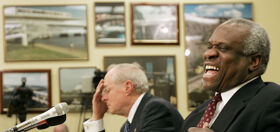
Denying gay Americans the right to marry isn’t so much an argument about logic (Do reasonable people support discrimination in any form? Of course not) as it is about morals (My God says marriage is for heterosexuals, and you silly activists will never change my mind). But even as we see evidence that shifting marriage equality’s strategy from the legislature to the court makes sense, the debate will remain raging in state capitol buildings. Except between now and whenever lawmakers decide to approve the M-word for gays, these elected officials won’t be merely influenced by their religious beliefs, but by the real-world concerns of their constituents, like the economy and healthcare. Or so it’s being falsely argued.
Alex Balk, writing at The Awl: “Many of the objections you hear center around religion, but the sorry undercurrent behind the unwillingness to grant the same rights to homosexuals that their fellow citizens already enjoy and frequently abuse is actually one concerning politics and economics, i.e., in These Troubled Times legislators are not willing to take a chance on equality while their constituents are more concerned about jobs and wages. Basically, gays are screwed until the economy picks up again and we all feel so prosperous that we don’t care whether or not two committed partners who happen to be of the same gender want the same benefits as everyone else. It’s unfortunate, but that’s the way it is.”
Actually, that is not true.
While the argument makes for some good copy — Balk asks financial blogger Felix Salmon for some future milestones that’ll make voter concerns less arduous for lawmakers to cast pro-gay votes, like when unemployment stabilizes and the Dow creeps up a bit more — it completely misses the bigger picture: Most lawmakers voting against gay marriage are only using “jobs” and “the economy” and “immigration” and “healthcare” as excuses for why they are not giving a nod to eliminating marriage discrimination. Their real reasons, as you might have guessed, come down to religious beliefs, political party politics and power plays, and the powerful lobbies behind the anti-same-sex marriage effort.
How about we take this to the next level?
Our newsletter is like a refreshing cocktail (or mocktail) of LGBTQ+ entertainment and pop culture, served up with a side of eye-candy.
Would it be accurate to say all lawmakers who point to these other, more important matters for their delay on gay marriage are lying? No. It’s very likely you’ll find many of them really do believe there’s just not enough time for equality right now. (Obama sympathizers make that argument daily.)
But we’d argue they’re in the minority. As evidenced by the State Senate votes that came New York and New Jersey — which arrived after endless finagling between activists and Senate leaders — most of these lawmakers who testified about the proposed legislation pointed not to their stuffed personal calendars, but to their problem with “redefining” a word. The economy was not on their minds; their faith was. They listened to their constituents, sure, but the outcry was about violating a sacred institution.
In bad and good economic times, lawmakers have found reasons to avoid votes of conscience. And they will always find an excuse to avoid what they claim to be a “hard” (but what we insist is among the easiest) vote. Whether you blame Wall Street or the Fed or the Bush administration for the current recession — and the current excuse pattern — is up to you. But let’s not kid ourselves into thinking that, should the economy rebound, and healthcare reform controversy die down, and immigration measures go through, that lawmakers’ faith-based belief that gays and lesbians are less than is going to disappear. There will be other reasons for delay: terrorism and two wars; education; the homeless; an exploding star that will destroy Earth in 10 million years.
As Balk writes, there will be no material movement on gay marriage by state legislatures until “unemployment below 6%, Dow at 12000, and deficit less than 3% of GDP.” We’d argue there will be no material movement on gay marriage by state legislatures until cowardly anti-gay officials are removed from office, and perhaps even until we have a president who’s willing to actually throw his support behind equality — but that’s just us.
But as we look toward the months and years ahead, as this “inevitability” of gay marriage snakes its way from sea to shining sea, we should also expect the economy will begin to recover. That won’t be the reason why more states enact marriage equality over the next decade, but it will certainly be a pleasant aside.



















terrwill
Actually the fact that our ecomomy is still tanking can be
good news. Because if anyone can put forth a solid argument
that Gay marriage will bolster the economy without there being
drastic reform measures adopted that would end the quid
pro status quo which allows certain politicians to gain
from secret deals with various sectors they will suddenly
“see the light” and allow the Gays to marry. Because while
pandering to the rightwing lunatics is profitable, other
actions are far more beneficial to them. Anything that can
bring in additional revenue will be looked at. That’s why
I predict that within 10 years you will see legalized pot
sales in most states. There projections that pot tax revenue
will bring in tens of millions of dollars for California.
Ahnorld is 100% on board. They recently began taxing sales
of pot dispensed from the medical marijuahana clinics. And
the owners are all on board, if they can get their product
into the revenue stream there is very little chance of sale
of pot being disallowed. We all know that the Gays will go
way overboard with the floral arrangments, just need to
add projections that the Gays can add even more to the
states coffers………………
W.
Getting Jesus out of office might not be such a bad idea.
Brian NJ
I am not supporting Obama again. If he wants to throw me under the bus, I know how to act in kind. The election in 2017 will bring new candidates, and new possibilities.
terrwill
Did ya’ hear that Mr. 9/11 Rudy Guilianni said on George
Stuffinenvelopes that there were no terrorist acts on US
soil under George W……………….
Michael
Brian, I have a feeling we’ll see some new faces emerge for the 2012 election. President may be like Jimmy Carter, a one hit wonder. Only difference is, I have respect for Mr Carter.
AndrewW
“The economy was not on their minds; their faith was. They listened to their constituents, sure, but the outcry was about violating a sacred institution.”
There is no “political solution” available to the LGBT community no matter what the economy or work load of politicians. The SOLUTION is to appeal to the people, not the politicians.
We will be equal (including marriage) when people believe we are. That means we need to focus on our fellow citizens – not some false hope of a political solution. We need to talk to our neighbors, friends, co-workers and even strangers. It isn’t just coming out, we must ASK for help.
We need to create our equality, not have it granted, or ordered, or negotiated, or approved. It is OUR responsibility.
If we are ever to have an effective movement we need to begin to think about winning, not simply surviving. We can’t win until we start a conversation with our fellow citizens. Polling data has changed over time – primarily because of time – but, we need to change it by engaging our fellow citizens.
Let’s hope 2010 is the year we actually start a real, sustainable movement. 50 years is enough time to waste on the false hopes of politics. This year we begin the real work or rebranding “gay” and enrolling people in our fight for equality.
John K.
Unfortunately, we had a state legislator in NJ yesterday named Sean Kean who spent a couple of minutes talking about how great gay people are for the economy and otherwise and then, like Gollum from Lord of the Rings, became a raging lunatic and voted against us. Let me repeat that: In these tough economic times, he STATED ON THE SENATE FLOOR how great gays are for the economy, and then voted against us anyway.
AndrewW
@ Brian NJ:
“I am not supporting Obama again. If he wants to throw me under the bus, I know how to act in kind. The election in 2017 will bring new candidates, and new possibilities.”
What, do you believe Obama has a magic wand and he can just tell the Congress what to do? The majority of Congress is anti-LGBT. They represent the views of their constituents. Until that changes, we don’t get anything passed in the Congress. The only real solution is to change the minds of their constituents. It is something the LGBT Community has never tried to do and yet it is the ONLY way to WIN.
So, instead of waiting 7 years for some magical political solution, why not do the real work of enrolling our fellow citizens? The LGBT Community “waited” through the Bush years. In fact, we’ve been waiting 40-50 years for our political savior.
If we really want our equality we’ll need to take responsibility for actually creating it. Waiting is not an option and hope is not a Plan.
romeo
That argument is a smokescreen. Conservatives and religious fanatics have more influence when the economy is good. I think it must be lazy-assed, cowardly Democrats coming up with that argument to rationalize their inaction. In any case, the truth is we are being lied to about the “rebounding” economy. The numbers are not really there. We were thoroughly ruined in 2008, and it will be years digging out. The old “prosperity” was an illusion. The very thing that created it, easy credit and lack of regulation, are the things that ensured the collapse. Reagan was the worst thing that ever happened to this country — for everybody.
Rather than that argument, I think just the opposite will prove true. When we’re all in the shithole together, gay and straight, equality for everyone won’t seem such a stretch.
AndrewW
@ Romeo:
WE have influence. We don’t use it, but we have it. If we did we could actually create our equality. But, we’re lazy and have been sold the false hope of some political solution.
We don’t deserve equality until we get off our collective asses and do something about it. Blaming the “economy,” or other distractions is just another lazy excuse.
Each of us has the ability to influence the beliefs of our neighbors, friends, associates and even strangers. When we actually do that work, we will achieve our equality.
Brian NJ
AndrewW
You are surely right about effecting change by being a good, out citizen, and trying to inform. But I am not going to let officials off the hook. My patriotism and sense of worth is drawn to making sure that they follow the law of equal protection. That is what this whole country is about. So, I can’t drop my patriotism any more than I can drop Tabitha’s Salon Takeover, even though cable is costing me 60 clams a month. $%$@@%^
That is a little off-topic, but Tabitha could save the world, if only she had the chance.
AndrewW
@ Brian NJ:
If you want to own your elected officials, get their constituents.
We NEED a way to get the voters, not the politicians.
——————————–
Way off topic: Industrie Hair Gurus, Ridgewood NJ
Mike in Asheville, nee "in Brooklyn"
Wow Queerty, job well done; good analysis and criticism. And, well written with surprisingly good grammar and spelling to boot. Thanks.
Would it be too much to ask that you hold up to this higher standard?
Truly I am not trying to be an ass about this. Irrespective of whether one agrees or disagrees with your opinion, a well written argument furthers the cause of enlightenment and expands knowledge. Too many times a good point Queerty attempts to make is missed due to just bad writing combined with poor grammar.
robert in nyc
If more people were working, there’d be less time to protest, stuff envelopes, etc…. Work is distracting, all everyone has time to do is think about nothing…
robert in nyc
Further, look at the women in those pics…those cheap acrylic blouses belong in an office with grey cubes.
dontblamemeivotedforhillary
Gays are the third largest donor base to the Democrats after Hollywood and Trial lawyers. While 2010 will possibly see the House switch sides, unless the Obama administration can turn around this economy, we can expect a loss in the White House in 2012. Liberals will stay home or vote third party like the pro-gay Green Party like with then Moderate Al Gore. Some Gays more interested in strategy than legislative achievements for Gay Civil Rights might lament the loss but sometimes you have to have a Republican interim to better screen a pro-gay candidate. We should be looking for a hopeful lesbian President with a track record and progressive agenda to really take back the White House (and what we thought was “our” party of inclusion not hostility!) Change can bring better change…after angry seniors decide the next two election cycles of 2010 and 2012, the pendulum could well swing for National Federal Civil Rights Equality measures in 2016! Wouldn’t it remake the Democratic Party demographic if the Republicans decided to throw us this legislative bone if it meant keeping the White House…and destroying the Democratic majority forever.
Wen
I recall I read that because NY state didnt legalize gay marriage, they miss out now on about 2 million dollars (or was it 20?) on revenues, from ie tourism. There is ample evidence gay marriage creates money, not costs money, so what the guy says is really not correct.
Sug Night
I think the Romans had at least a few good ideas….throw ’em in with the lions and she how that goes, besides it will help save several species of endangered lions….
Sug Night
…sort of a Mideivel Times but hopefully with better food.
Brown Gay Al
What a joke? For the gay Democrats err Stockholm Syndrome victims
stop thinking about being pounded by Obama’s pole and think rationally.
You are never going to get a better opportunity than this in the near future with 60 senators , 80+ seat majority in the house and the most liberal senator as president.
But you were too busy worshipping Obama’s knob to see how you were sold to the wolves by Obama and the Democrats.
Now suffer for putting all your eggs in the Democrat’s basket.
Brian Miller
What, do you believe Obama has a magic wand and he can just tell the Congress what to do? The majority of Congress is anti-LGBT. They represent the views of their constituents. Until that changes, we don’t get anything passed in the Congress. The only real solution is to change the minds of their constituents.
The apologists for political parties and their fatuous bullshit never fails to amuse me.
If Congress “represented their constituents,” there would have been no TARP (85% opposed), no Iraq War (57% opposed), and no present mandatory private insurance “health reform” (62% opposed). There would also be no H1-B visa program (60% opposed), no deficit spending (55% opposed), no DADT law (78% opposed) and no NAFTA (78% opposed).
Don’t feed me political party bullshit. Stop drinking the Kool Aid, politicians are not about “representing their constituents,” they are paid whores for hire to the highest bidder.
Michael Letterman
OMG this is so ridiculous it should be classified as ‘science fiction’. No hold on make that ‘fantasy’.
Michael Letterman
Nah it should just be classified as ‘wishful fantasy’.
chris
@Michael
Fantasy? What, like your fantasy to suck a big, fat cock?
Michael Letterman
chris: No bottom feeder, like your fantasy of being accepted as ‘normal’.
BTW my standard policy is anyone brave enough to put their ‘big fat cock’ near my face will commence to lose said ‘big fat cock’ in a manner of my choosing not to be limited to being ripped off manually, sliced off and fed to the offender and or whatever my mood so dictated.
Does that clear things up for you adequately?
Wen
@25 ofcourse only after you suck the big fat cock, let it come all over your face, ey? Then your shame sets in and your homosexual desires need to be ‘killed’. Yeah, were on to you. Youre basically saying you hate your own dick and your own homosexual desires. I thought you said you were smart? Well, I will point out to you you have a huge blind spot.
Michael Letterman
Wen: I’m proud of you wen, been researching how the other girls do it? Thinking about coming over to the ‘normal’ side?
Not only do I have no homosexual desires if I did I would do the honorable thing and not act upon them dedicating my life to finding the cure for it.
Oh I never said I was smart, others have had the common sense to say it for me. No blind spots here. Nothing perverted about me or my wife nor do I need to love my own ‘dick’ (what a lovely term short for Richard isn’t it? Anyway why would I need love my own cock when I have a georgous, sweet, wonderful wife who loves it herself and jealously keeps it all for her own pleasure.
So come on down to the Big Apple and have one of the famed NY male “lovers” show you what you’ve been missing.
David DC
Mr. Brian Miller said:
“If Congress “represented their constituents,” there would have been no TARP (85% opposed), no Iraq War (57% opposed), and no present mandatory private insurance “health reform” (62% opposed). There would also be no H1-B visa program (60% opposed), no deficit spending (55% opposed), no DADT law (78% opposed) and no NAFTA (78% opposed).”
You’re drinking the Kool-Aid. What you leave out about the above analysis is that most of the polling data in your list is from many years AFTER those decisions or is based on a National sample. For instance, there was NO polling data about DADT in 1993 will Bill Clinton signed it into law and each State has a different opinion on ALL of the issues you list.
Our problem is with the US Senate. We have two Senators per State. 20 of the 50 States are clearly not Anti-LGBT (mostly on the coasts). 20 are very Anti-LGBT (mostly Bible Belt) and 10 States are mixed.
You reference “National Polls” not State Polls – that’s the BIG difference. In Alabama they are very religious and Anti-LGBT. Alabama Senators ALWAYS vote against us – just like their constituents. Massachusetts Senators ALWAYS vote for us – just like their constituents.
Our challenge isn’t to wave National Polling data in the faces of our US Senators – but polling data from their States. In order to be effective we MUST change the polling to reflect acceptance of LGBT issues.
The truth is we are doing NOTHING in that regard. If you want politicians to support us we must change their constituents minds or at least demonstrate that they have changed.
I agree with AndrewW (Posts above) there is no political solution to LGBT Equality. Until we get other Americans to “understand” our plight and support our equality we’re not getting anywhere. We have missed that point for 50 years. Maybe we’ll wake up now, after we have our second Bill Clinton in the White House. Obama is NOT going to deliver our equality – we need to.
We should waste any more money on politics until we change the polling. We won’t get Alabama or Mississippi in the short term, but we can get about 35 States. That would equal 70 US Senators and at that point we will have won.
So, instead wishin’ and hopin’ that the Democrats will provide our equality or that we can somehow bribe them, figure out how to get our fellow citizens on board.
David DC
Also from Mr. Brian Miller:
HRC Does It Again
HRC Watch notes that yet another disappointed HRC Democratic supporter writes to relay his experience with a recent “pro-gay Democrat”:
At the event, I told him how I was led to his campaign by HRC and the links to sites supporting Democrats running in close races all over the country. I also told Jerry I understood they had a lot of important things to do when he gets to Washington, and that I understood the Democrats had to play to the center until 2008. Then I said, “But I hope that when the time comes, you will not forget that my partner Juan and I are also a family,” as I reached out my hand to shake his.
What happened next stopped me in my tracks. It happened in a split second; his smile faded; his eyes hardened; his grip stiffened. And he said, simply, “I’m afraid I’ll have to let my conscience be my guide in those issues.”
I have seen that look dozens of times from others. His implication was clear. We cannot count on Jerry McNerney to stand up for LGBT equality.
I feel like a fool for assuming that because he is a Democrat he would support us. I am so disappointed. If the time ever comes to vote on a constitutional amendment banning Juan and I from getting married in the U.S., I believe it is clear how Congressman-elect McNerney will vote.
Sadly, it’s a feeling that GLBT Democrats and GLBT supporters of Democrats know only too well. . . not to mention a feeling that’s a lot rarer for GLBT Libertarians and GLBT supporters of Libertarians.
Posted by Brian Miller at 4:27 PM on Thursday, March 08, 2007
So, kindly Update us on your ideas about a “political solution.”
Erico
A must read…
Erico
http://www.newsweek.com/id/229957/page/1
Michael Letterman
Erico: Thank you it was quite interesting. I suppose for every position there are many opinions and while I do not agree at all with the writers I accept their opinion and found it a refreshing change from the usual.
Michael Letterman
I’d actually like to see you win that case. It would be progress.
McShane
What caused the economy to tank and what is it’s perpetual source of eventual destruction is the fact that we virtyually have only one party now, that is the neoliberal/conservative anti-labor Corporate/colusion of everything.Economic Neoconservatism(lneoliberalism) was been well and alive since WW2 and brought to a head by Clinton.
Untill the Corportation are not in control of the government we are al fucked,because people who work have no candidate-ever. As has been shown in every instance buy one , America’s Neoliberalism has destroyed democracies and implanted Dictatorships. We have no say in outr government now, and likely never will as long as it exists in it’s present form.
Michael Letterman
Actually you’d have a better chance winning every lottery contest in the country on the same day as winning gay marriage.
Who ever is posting using my name be duly warned the subpoena has already been written and I am arranging for service this week. You will be prosecuted to the fullest extent of the law and I will make sure you get sentenced but not until after a lengthy trial in which you will require to pay your own attorney outrageous sums of money.
You can spare yourself this indignity with a sincere apology or my preference is you do nothing and let me have the most fun I’ll have in a long time.